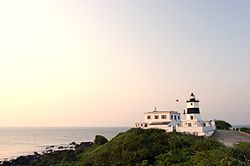Shimen District (Chinese: 石門區; pinyin: Shímén Qū; Pe̍h-ōe-jī: Chio̍h-mn̂g-khu), also known as Sekimon, is a sparsely populated rural district in the northern part of New Taipei City in northern Taiwan. It is part of the North Coast and Guanyinshan National Scenic Area and includes Taiwan's northernmost point, Cape Fugui.
Shimen
石門區 Sekimon | |
|---|---|
| Shimen District | |
 The Fuguijiao Lighthouse at Taiwan's northernmost point | |
 Location of Shimen in New Taipei City | |
| Coordinates: 25°16′07″N 121°34′17″E / 25.26861°N 121.57139°E | |
| Country | Republic of China (Taiwan) |
| Region | Northern Taiwan |
| Special municipality | New Taipei City |
| Area | |
| • Total | 51.26 km2 (19.79 sq mi) |
| Population (March 2023) | |
| • Total | 10,902 |
| Time zone | UTC+8 (CST) |
| Postal code | 253 |
| Website | www |
| Shimen District | |||||||||||||||||||||
|---|---|---|---|---|---|---|---|---|---|---|---|---|---|---|---|---|---|---|---|---|---|
| Chinese | 石門區 | ||||||||||||||||||||
| Literal meaning | Stone Gate | ||||||||||||||||||||
| |||||||||||||||||||||
History edit
While known to earlier explorers, including the Dutch, the area was first explicitly mentioned in Chinese annals in 1694 as Shimenshan (石門山; 'Stone Gate Mountain').[1] During the period of Imperial Japanese rule, Shimen was called Sekimon Village (石門庄), and was governed under Tansui District of Taihoku Prefecture. In 1945 when the Kuomintang took over administration of Taiwan the area became Shimen Rural Township, a part of Taipei County. With the reorganization of Taipei County in 2010, Shimen became a district of the newly created New Taipei City.
Geography edit
The interior of Shimen is predominantly mountainous, with small areas of flat land on the coast.[2] The district is bordered to the north by the East China Sea, to the southwest by Sanzhi District, and to the southeast by Jinshan District.
Administration edit
Shimen is part of New Taipei City, a special municipality under the Republic of China government. The district itself is divided into nine villages: Shanxi (山溪里), Shimen (石門里), Laomei (老梅里), Jianlu (尖鹿里), Maolin (茂林里), Caoli (草里里), Qianhua/Cianhua (乾華里), Fuji (富基里), and Demao (德茂里).[1][3][4]
Economy edit
Tourism is a major contributor to the economy of Shimen, which also produces a number of agricultural goods including mandarins, peanuts, and tea.
Education edit
Shimen has one junior high school, Shimen Junior High, and three elementary schools; Shimen, Laomei and Qianhua.
Tourist attractions edit
Historical buildings edit
The Fuguijiao Lighthouse is located at Cape Fugui.
Nature edit
Shimen is home to Baisha Bay.
Festivals edit
Shimen has also been home to an annual kite festival since the year 2000, drawing competitors from around the world.[5]
Others edit
Infrastructure edit
Shimen is the site location for Taiwan's first nuclear power plant, the Jinshan Nuclear Power Plant.
Transportation edit
The main road route through the district is the Provincial Highway 2. It is also served by a number of other county-level roads. There is no rail transportation in the district.
See also edit
References edit
- ^ a b 歷史沿革 [Historical Development] (in Chinese). Shimen District Office. Archived from the original on 2012-04-29.
- ^ 石門簡介 [Introduction to Shimen]. Shihmen Farmers' Association. Retrieved 2011-01-04.
- ^ "Villages Introduction". 石門區公所EN Shimen District Office, New Taipei City Government (in Chinese (Taiwan)). Retrieved 4 July 2019.
the current administrative area contains 9 villages, which include Demao, Fuji, Laomei, Shanxi, Shimen, Jianlu, Qianhua, Maolin, and Caoli.
- ^ "2018 Local Elections". Central Election Commission (in Chinese (Taiwan)). Retrieved 5 July 2019.
Demao Vil. Fuji Vil. Laomei Vil. Shanxi Vil. Shimen Vil. Jianlu Vil. Ganhua[sic] Vil. Maolin Vil. Caoli Vil.
, Chinese version: [1] - ^ Shan, Shelley (2008-09-24). "Shihmen to launch kite festival". Taipei Times.